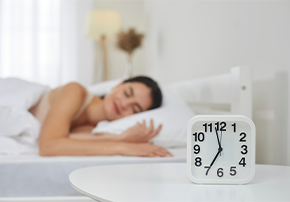Maintaining Lifestyle Balance


Want Better Life Balance?
Weigh Up Your Sleep Options.
You’re swiping wildly at curveballs. Maybe life has become a game of whack-a-mole. You’re perpetually knee-jerking. Or you’re just dropping too many balls. Pick a cliché. It’s all treadmill stuff. You’re not quite in control. And it’s taking its toll.
It may seem counterintuitive, but the busier your day, the more you need to prioritise your sleep. Actually, you should be routine about your sleep hygiene, regardless. And by sleep hygiene we mean a methodically practised level of sleep-promoting behaviour, both night and day. Let’s call it the sleep-for-life balance.
Your sleep-for-life balance by day.
Some people are good at multitasking. But the aim is not to see how much you can do at once, but rather how many tasks you get to complete, one at a time. It takes a certain regime. And the discipline to stick to that regime.
Let’s pick a few scenarios.
- The working parent– Being an all-present parent, as well as holding down a demanding job, can have its challenges. Priorities are adjusted. It’s all about work and kids. And perhaps you pay slightly less attention to yourself.
- Career focus– The alpha over-achiever who just keeps delivering can be quite inspiring, if not a little intimidating. Life balance is perpetually tipped towards that next goal. The drive, the energy, is impressive. Ultimately, it is just not sustainable.
- Impulsivity – It’s almost a sort of mania. Saying ‘yes’ to everything can come from both an overdriven ambition as well as an underlying fear. You see yourself as the ‘can do’ operator. You also worry that what you don’t take on may be perceived as a weakness.
- The bumbler– Time-keeping and simple work and home admin is not your superpower. It’s not that you’re incapable. You’re likely very well achieved and even supremely talented. There are some things that just aren’t in your frame of reference.
Daytime habits that affect sleep.
The two things to take into hand during your day are exercise and diet. These are the two physical behaviours that can directly affect the quality of your sleep come the evening.
Exercise
For the time-constrained with ad hoc work and family demands, it may be challenging to maintain a daily exercise routine. Exercise does not have to be rigorous. What’s important is to take even just a half hour a day to breathe deeply and get your heart rate up. A brisk walk or a lunchtime jog will do. If you’re able to incorporate a regular exercise class or local gym session each day, good for you.
Diet
Now here’s where things can veer a little off course. Ideally, you want to maintain a healthy diet. You need brain food and physical energy to see you through the day. When time and pressure close in, however, it’s easier to eat on the run. But that’s not why it’s called fast food. You may also find that you simply forget to eat. With your head uncompromisingly focused, your stomach runs on empty.
Binge eating throughout the day
Do you hit a peak in the mornings and a low in the afternoons? Perhaps you’re running on too much caffeine. You’re snacking on carbs and sugar later in the day. It’s comfort eating to reward your unrelenting work ethic. All that intake during the day, especially in the late afternoon, can impact your ability and readiness to relax and wind down before bedtime. And, likewise, poor sleep will only exacerbate your need for quick-fix energy drinks and foods during the day.
Not eating during the day
Come the evening when you finally get to slow down, it’s not unlikely that you’ll suddenly realize how ravenously hungry you are. Your body will crave sustenance and replenishment. You’ll go large at dinner time. A second helping is followed by scraping the leftovers.
Chances are, since you’re putting so many hours into your day, you’ll eat later in the evening. With a sleepy head and a tummy well fed, you’ll flop into bed for a well-deserved rest. Except, maybe not. You still have a rather large meal to digest. So, while your head drifts off, your metabolism has to stay hard at work, digesting and processing your dinner. This can adversely affect the quality of your sleep, preventing you from enjoying the benefits of a deep slumber, when the body should be recuperating and distributing vital minerals and vitamins, rather than processing undigested food.
Night-time habits that affect sleep.
Of course, it always feels better to focus on the positive behaviours that can improve your sleep. But we’re trying to find a life balance here. So, it’s likely the potentially negative habits we need to identify. When we’re rushed off our feet, we don’t always look to see where we’re going. Like a daytime regime, there are probably two overriding behaviours to take care of for better sleep: preparation and environment.
- Preparation– Physically and mentally settling yourself is important ahead of bedtime. Take an hour or so to shut off. Check in with family. Go calmly about a few house chores. Some find it quite therapeutic to get into the kitchen, or out into the garden.Try not to let your home become a “branch office”. At very least, set aside a definitive time to knock off those final emails or finetune that report. Certainly, do not make a habit of slugging it out through the night, sustained by energy drinks or coffee. If you’ve had a particularly bad day, one you’d sooner forget, go gently with that stiff drink. Night-time alcohol and caffeine are no friends of quality sleep. Find the means and techniques to put aside the stresses and challenges of the day. You can dive back in tomorrow.
- Environment – Calming, soothing, restful. That’s the singular purpose of a bedroom. If pillow talk is your only chance to be discreetly away from the kids, try not to make it a time for arguing, deliberating or complaining. Leave that all outside the bedroom door. Again, you can pick it up first thing in the morning, when your heads are rested and a lot clearer.
Set your phone to sleep mode. No calls. No pinging messages coming in. Don’t stare vacantly at a TV screen into the small hours. If it’s a quick program, preferably something light, have the discipline to switch off, perhaps read a little, then simply turn down the lights and allow yourself to drift off.
Keep the bedroom cool. Allow a gentle, fresh airflow. Ensure you’re properly positioned, to the side or comfortably on your back, so that you breathe easily and deeply throughout the night.
Find perfectly balanced sleep at Dial•a•Bed.
Don’t have time to worry about your mattress? No idea which mattress would suit you best? First of all, stop. It’ll take just a few concentrated minutes. You can trust Dial•a•Bed to have you sorted in hardly any time at all. Check out South Africa’s largest range of branded bed options at www.dialabed.co.za. Share your sleep preferences with a Dial•a•Bed consultant on the phone or online, as you browse through your options. Then place your order through the webstore. If you’re not happy with your decision, we’ll swap it for a more suitable alternative within the first 100 nights of purchase*. No problem. See? There’s nothing like convenience for a little more life balance. #SleepForLife.
TAKE CARE: Lifestyle recommendation are not medical advice. Always consult your healthcare professional should you be experiencing prolonged sleep difficulties or related health issues. *Terms and conditions apply.





